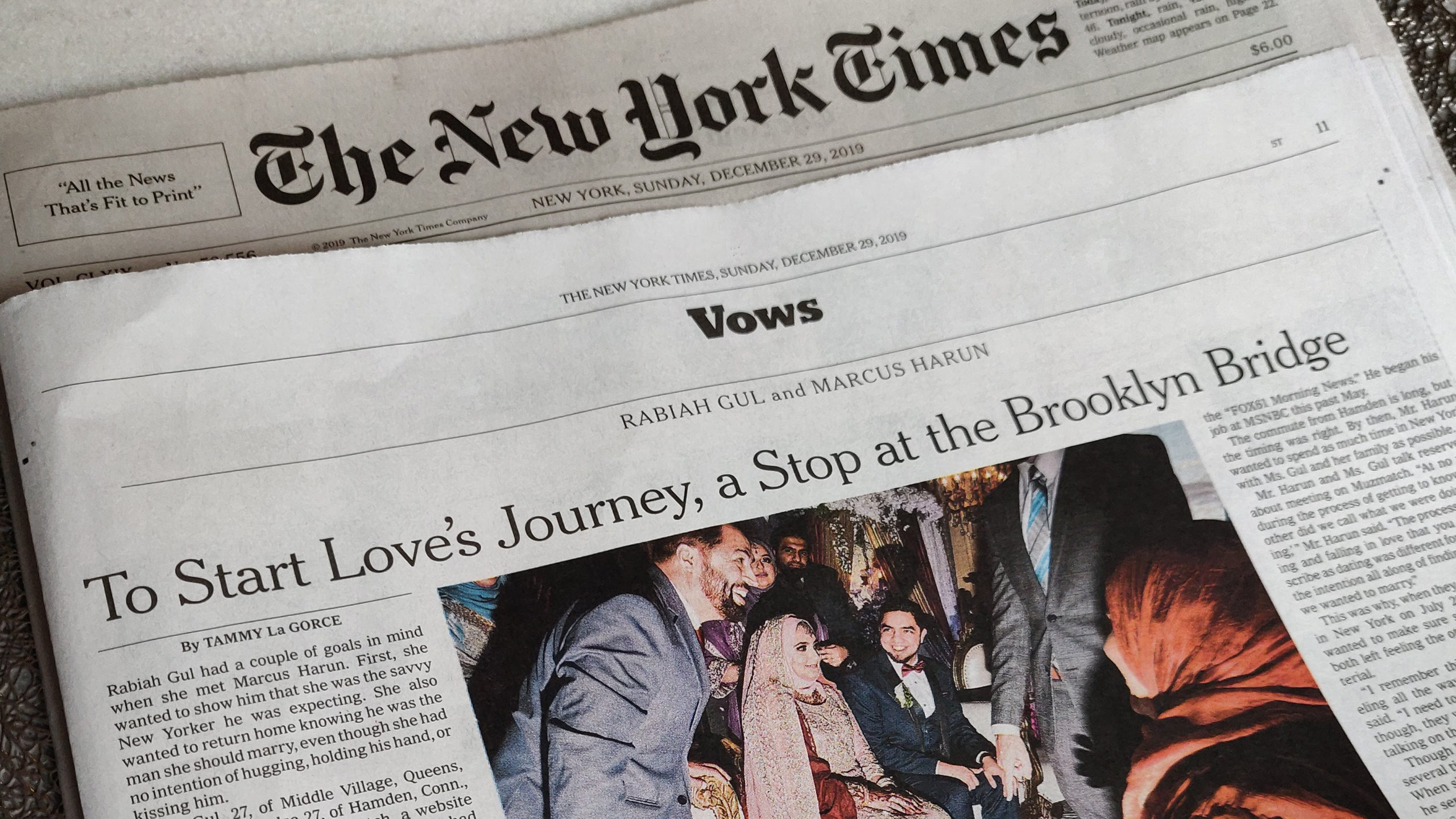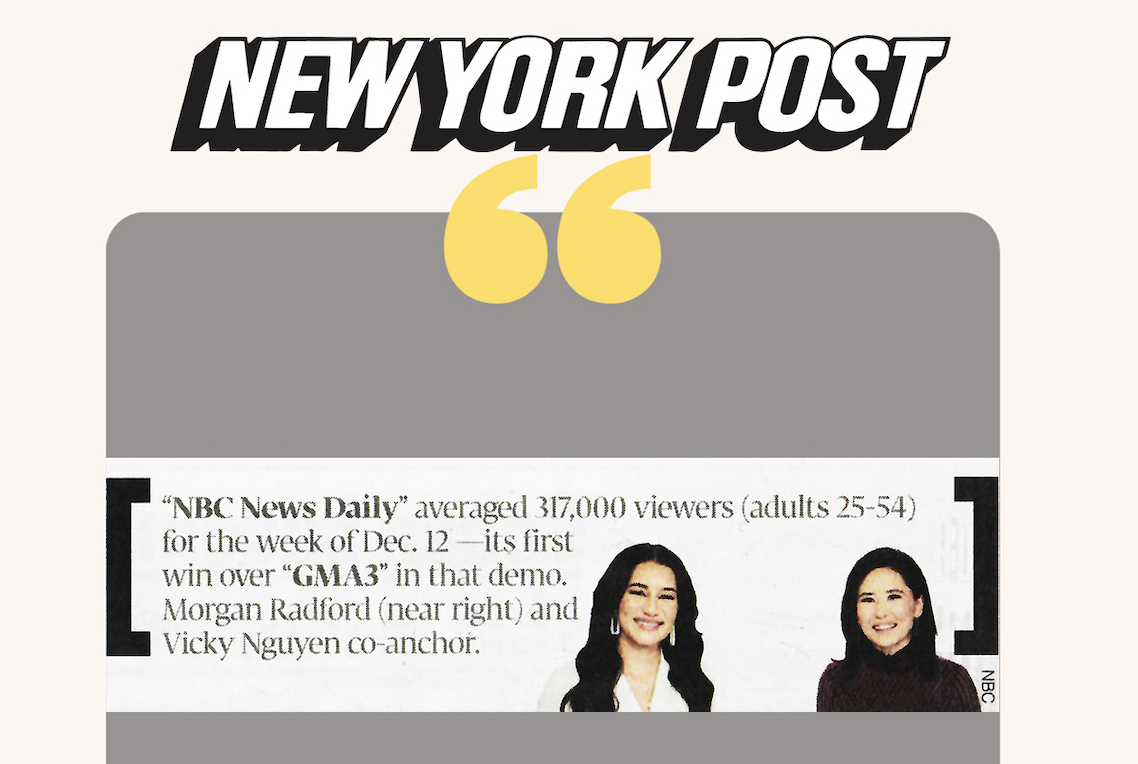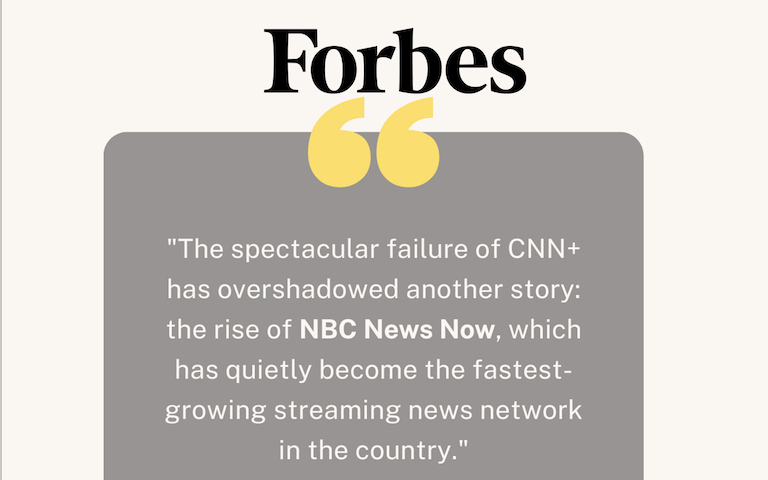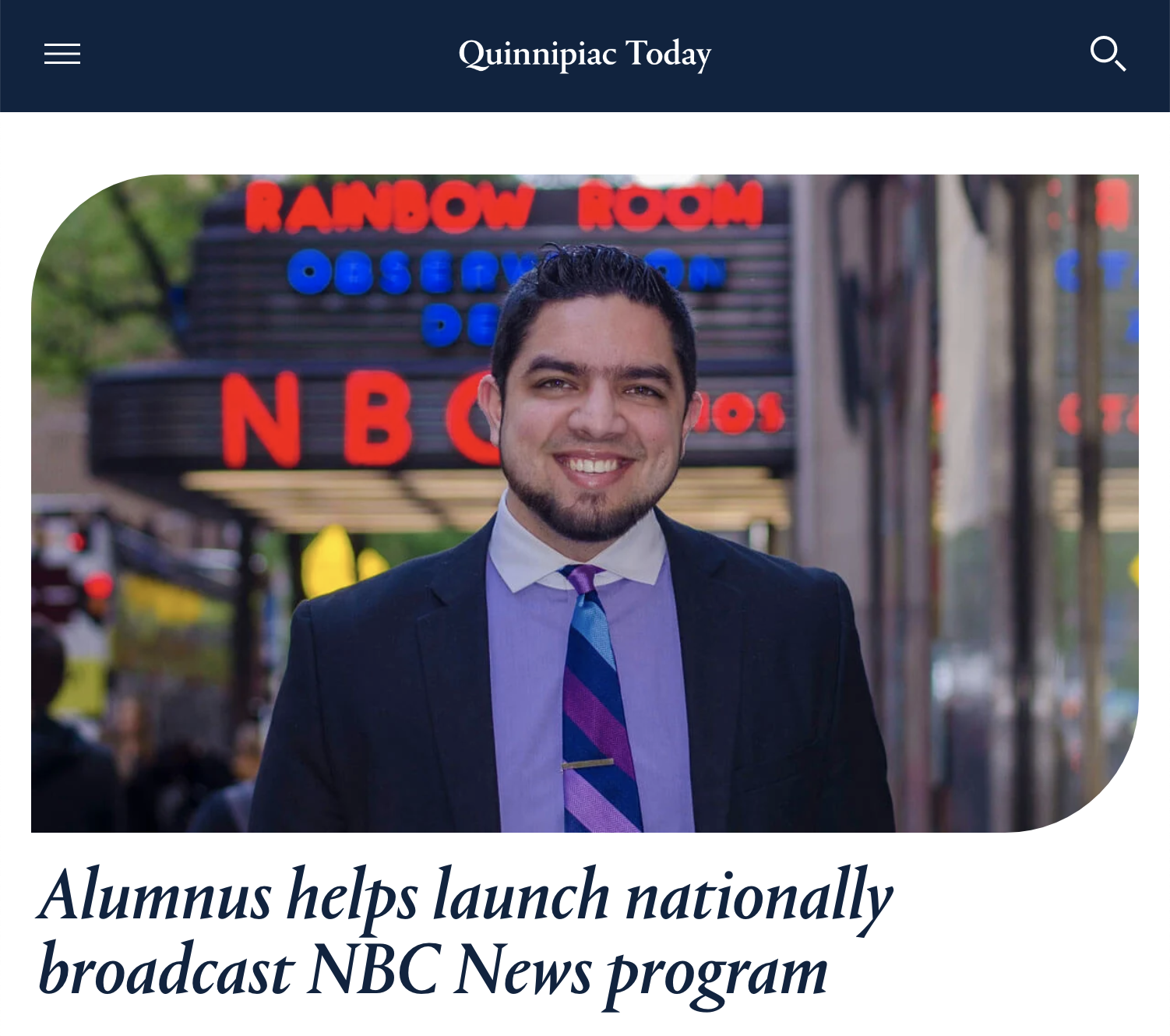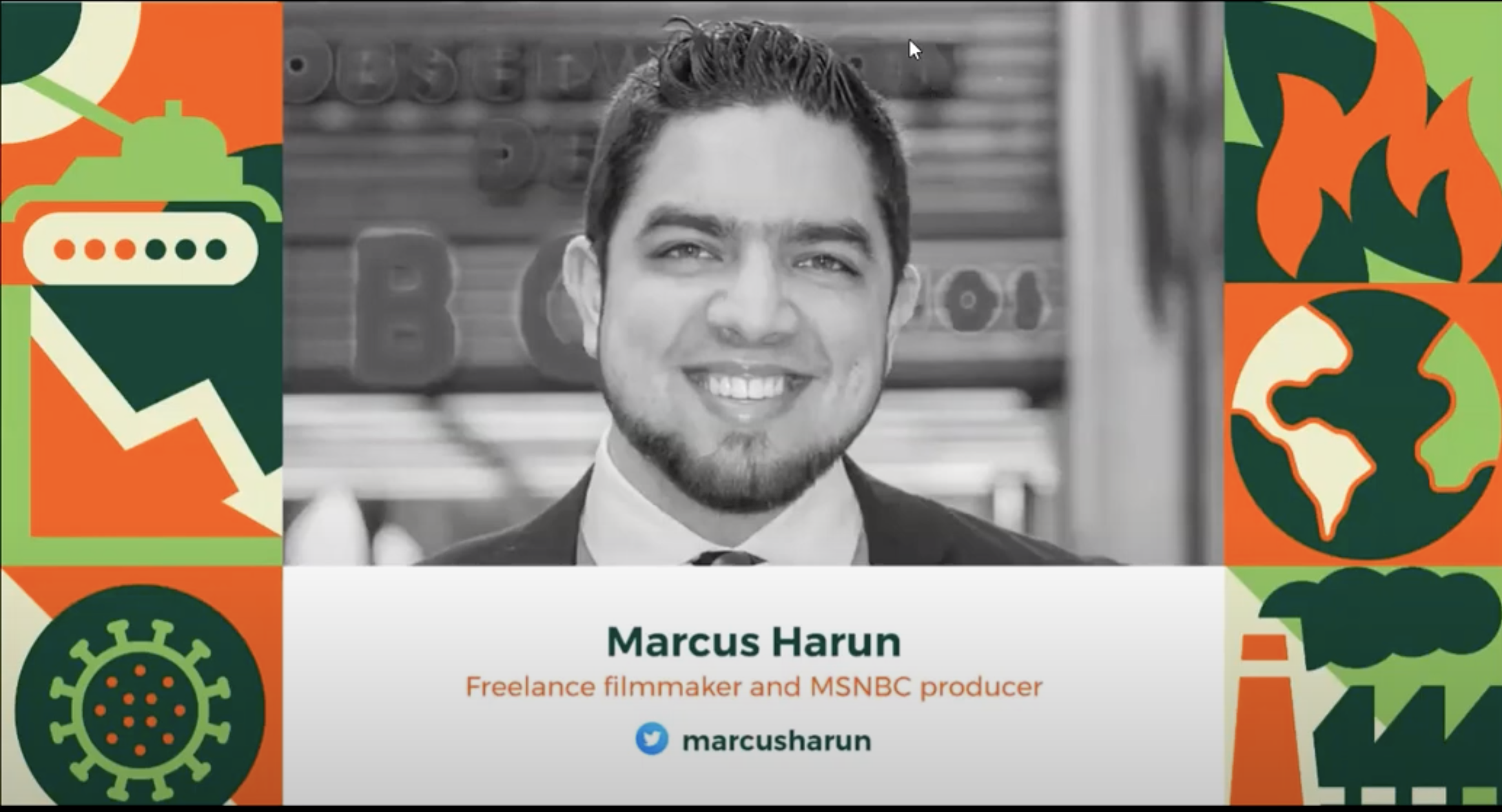The New York Times’
Not Quite Dating, but Certain About Forever
Rabiah Gul and Marcus Harun met last year through Muzmatch, a website that matches Muslim singles.

By
Rabiah Gul had a couple of goals in mind when she first met Marcus Harun. First, she wanted to show him that she was the savvy New Yorker he was expecting. She also wanted to return home knowing he was the man she should marry, even though she had no intention of kissing him, hugging, or holding his hand.
Ms. Gul, 27, of Middle Village, Queens, and Mr. Harun, also 27, of Hamden, Conn., met in July 2018 on Muzmatch, a website that matches Muslim singles. Both had signed up because they sensed that meeting a religiously compatible partner in their daily lives might be a challenge.
Offline, though, their lives looked quite different.
Ms. Gul is a lifelong New York City resident born into a large, mostly female Pakistani family. In addition to her parents and three sisters, she was raised in close contact with an aunt and four cousins, all girls, who also live in Queens. Mr. Harun is as suburban as Ms. Gul is metropolitan. He and his younger brother, Eunes Harun, were born in Connecticut to a Bangladeshi father and an American mother who shepherded them through soccer, Boy Scouts and apple-picking trips each fall.

Fascination with their contrasting lifestyles wasn’t what connected them on Muzmatch. Instead, both liked each other’s commitment to weaving traditional Muslim values into a modern approach to life and work.
“Marcus was very thoughtful when he said ‘Hi’ on the site,” Ms. Gul said. “He wasn’t superficial. He wasn’t the stereotypical guy who would say, like, ‘Cute pic.’ For some girls, that’s fine. But for me it’s a turnoff. I’m more than my picture.”
Mr. Harun also told Ms. Gul that he appreciated the emphasis on religion and family in her profile. And he was impressed by what she had achieved professionally. Ms. Gul is a tenant lawyer. After graduating summa cum laude from the City University of New York in 2013 and the University of Dayton with a law degree in 2016, she went to work representing low-income New Yorkers facing evictions and substandard living conditions at Boom!Health Legal Services, a nonprofit organization in the Bronx. She recently left Boom!Health for a personal hiatus and, after passing the New York Bar exam, is now looking for a new position.

For her, the plight of New Yorkers caught up in housing disputes is personal. “Housing law connects to my childhood,” said Ms. Gul, who wears a head scarf in public, and whose first name is pronounced Robb-yah.
Her parents, Gulraiz and Kalsoom Masood, arrived in New York from Pakistan in the 1980s. “They came to the U.S. not knowing the language, not knowing the culture and without much money,” she said. “Being exposed to tenants from marginalized communities facing unwarranted obstacles and seeing how many low-income residents were unrepresented tapped into a place of sympathy for me.”
Ms. Gul’s social consciousness also has taken on artistic expression. At CUNY, she wrote a comedic monologue called “Wudhu,” Arabic for “purifying process,” about her personal experiences trying to find New York City public restrooms where she could wash her hands, arms, face and feet before praying five times a day, a Muslim ritual. She performed the monologue at John Jay College, a CUNY senior college in Manhattan, as an undergraduate. By the time she was in law school, it was being performed as far as Indonesia and Ireland by other women.
On Muzmatch, “I was pretty wowed by her, and by how she balances religion and family and friends and having a career,” Mr. Harun said. “I love that she’s so into her career, and that she’s not the type of person who’d do a basic job at anything. She goes above and beyond no matter what she’s doing.”

The same might be said of Mr. Harun, a producer at MSNBC in New York who started his climb up the broadcasting ladder when he was in eighth grade. In 2006, his parents, Harriet and Mohammed Harun, let him build a news studio in their basement. The show he created there, “24 News Now,” got picked up by a public access station after he rounded up 20 fellow high school students from across the country to be reporters. When the local Fox News affiliate in Hartford, Conn., heard about the show, Mr. Harun was the subject of a news feature there. After he earned a bachelor’s degree in journalism in 2014 from Quinnipiac University, from which he also received an M.B.A. in 2015, he went to work at the station as the executive producer of the “FOX61 Morning News.” He began his job at MSNBC this past May.
The commute from Hamden is long, but the timing was right. By then, Mr. Harun wanted to spend as much time in New York with Ms. Gul and her family as possible.
Mr. Harun and Ms. Gul talk reservedly about meeting on Muzmatch. “At no point during the process of getting to know each other did we call what we were doing ‘dating,’” Mr. Harun said. “The process of meeting and falling in love that you might describe as dating was different for us. We had the intention all along of finding the person we wanted to marry.”
This was why, when they decided to meet in New York on July 28, 2018, Ms. Gul wanted to make sure she and Mr. Harun both left feeling the other was spouse material.
“I remember thinking, O.K., he’s traveling all the way from Connecticut,” she said. “I need to make it special.” By then, though, they were already spending hours talking on the phone.
Though Mr. Harun had visited New York several times, he was game to play tourist. When she asked what he would like to see, he sent her a picture. The Brooklyn Bridge was the backdrop.

“It was Dumbo, an area everyone flocks to,” Ms. Gul said. She arranged a meeting at Brooklyn Bridge Park, which afforded a view similar to the picture. There, they sat and talked. And fell in love.
“I get emotional just thinking about it,” Ms. Gul said. “He literally was my long-lost best friend. We talked about everything, from Kanye West to deeply intellectual things. The conversation just kept flowing.” Still, a kiss or hug goodbye was not in the offing for religious reasons: “According to Islam, any form of touching, kissing, holding hands or any sexual intimacy at all is reserved for marriage,” she said.
Ms. Gul met Mr. Harun’s parents soon after on the family’s annual apple-picking excursion. She had never been to Connecticut. “I had my first apple cider, my first apple cider doughnut,” she said. “And I got to connect with his family through this very cherished family tradition.”
Ms. Gul introduced Mr. Harun to her family around the same time. “I met a whole boardroom of people just sitting in her living room,” he said. “And they were so welcoming, even though I knew through the whole thing that having someone come and meet your daughter is a very big deal.”
By the time Mr. Harun started commuting from Hamden to the MSNBC offices, he was visiting Ms. Gul and her family regularly. Typical get-togethers included trying out New York restaurants Ms. Gul discovered on Instagram and hanging out in Brooklyn Bridge Park. The fact that they would one day marry was a forgone conclusion. And, according to Ms. Gul’s youngest sister, Faiza Masood, the happy outcome of an ideal courtship. “Rabiah and Marcus are similar in so many ways,” Ms. Masood said. “They’re both so passionate about what they do, and they’re both funny and independent.

Mr. Harun’s marriage proposal was a reflection of their personalities.
“There was a little bit less pressure than some people might have because we were both interested in pursuing marriage,” he said, “but I wanted to make it special.”
With the help of Rumanoff’s Fine Jewelry, in Hamden, he designed a platinum ring showcasing a family diamond given to him by his mother.
Then, on June 30, he drove to Queens for what Ms. Gul thought would be a typical get-together. Her first clue it was anything but came when they walked to get icees. The vendor handed her an envelope; Mr. Harun had arranged a scavenger hunt that brought the couple to half a dozen of their favorite spots around Brooklyn and Queens. “I had gone around to all these places and shown them a picture of Rabiah and said, ‘When she orders, hand her this envelope.’” Each envelope had a clue leading to the next location. The hunt ended where their in-person courtship began, at Brooklyn Bridge Park. Mr. Harun had a professional photographer waiting, as well as his family and Ms. Gul’s family. With the bridge as a backdrop, he got down on one knee and asked Ms. Gul to marry him.
Her yes, despite its inevitability, was an over-the-moon one. “Just the fact that he executed it in such a thoughtful, attentive way,” she said. “I was overwhelmed.”
On Dec. 15, at the Chateau La Mer in Lindenhurst, N.Y., the couple welcomed 175 guests for a wedding meant to celebrate their American-Muslim identity. Ms. Gul, in a tea pink lehenga sparkling with platinum and gold rhinestones, walked down a carpeted aisle accompanied by her parents to a stage set with a gilded settee. Mr. Harun, in a black tuxedo with a red bow tie, awaited her. The couple sat side by side on the settee for a ceremony in Arabic and English performed by Imam Omer Bajwa, the director of Muslim life at Yale.

“When one marries, one is pleasing God,” the imam said, asking the assembled to pray that Ms. Gul and Mr. Harun would bring each other happiness and tranquillity. After an exchange of rings, he pronounced them married. They were married in the Muslim sense; because the couple found out belatedly that the imam was certified to marry people in Connecticut but not New York, their legal marriage took place Dec. 10 at the office of the New York City Clerk.
The religious ceremony, before their family and friends, was more meaningful for both. “The City Hall ceremony allowed us to be married in the eyes of the law,” Mr. Harun said. “Being religiously married by the well-respected imam was what we preferred.”
On This Day
When Dec. 15, 2019
Where Chateau La Mer, Lindenhurst, N.Y.
Split the Difference Mr. Harun and Ms. Gul will move to New Rochelle, N.Y., after a honeymoon. “We wanted a place close to the city, where my family is, but also something close to the suburban life Marcus grew up with,” Ms. Gul said.
Cross-Cultural Meal A buffet dinner held in the same room as the ceremony featured dishes like chicken biryani and baked ziti. Instead of alcohol, which is forbidden at Muslim weddings, guests ordered ginger ales and Diet Cokes from bartenders in crisp black suits.
Bright Past, Bright Future Kenneth A Venit, one of Mr. Harun’s professors at Quinnipiac, praised Mr. Harun’s commitment to educating those around him about Islam. “When he was a journalism student, he came to my Global Community class and explained Islam through his eyes.”

